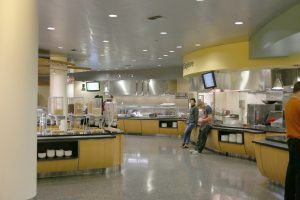
For students with special dietary needs, navigating through Dining Services can be tricky. It is hard to know what ingredients may be hiding in the multitude of dishes being served every day. Hopefully, that is going to change.
Dining Services currently provides resources for students with special dietary needs to check for ingredients online on a website called NetNutrition. This allows students to see what is in their food, including many common allergens. DS is looking into making some of that information available to students by the food.
“You can access it on your phone, your tablet, anywhere online,” said Kelsey Kincaid, residential dining manager.
NetNutrition has been helpful to Junior Kacey Finch who has a cinnamon allergy. She uses the website to look up if any dishes contain cinnamon.
“I thought it was really helpful that I was able to have it on my phone,” Finch said.
If students don’t have access to the Internet while they are in DS and haven’t previously looked online, this can cause problems and inconveniences. The tablet at the check-in station in DS makes this a little easier, but if a student is in a rush this may not be a feasible solution.
“Having it at their fingertips and being able to see it is important and necessary to prevent food reactions,” said Nicole Crouch, assistant director of Dining Services.
Junior Anne Wasiluk, who is allergic to mushrooms and tree nuts, has been directed to the stand for information, but she sometimes finds it hard to get there.
“It’s kind of hard, especially if DS is busy,” Wasiluk said.
Wasiluk said she would appreciate if the information about the food could be readily available by each of the dishes in DS, making it more convenient for her to check if what she is eating contains an allergen.
“Because of the pace and the busy schedule our students have, sometimes looking at NetNutrition isn’t feasible,” Crouch said.
The idea has been floating around for a few years now to put this information up in DS. This year it has been made into an initiative, but it is going to be a process said Crouch.
“We’re taking this year to research it well so we have a good system in place,” Crouch said.
They have to filter through different programs they could use to get the information up on the TV screens and create a symbol system of allergens to put on screen. They want to find the best way to provide information to Concordia students.
Another discussion Dining Services is having is about what will be included on the TVs as far as allergens and other dietary needs are concerned.
“We haven’t decided if this will include the top eight allergens and gluten, or if it’ll have other restrictions on there too,” Crouch said.
For example, they may decide to include whether or not a dish contains pork in case of religious dietary restrictions. The same goes for vegetarian and vegan dishes.
Although there is not a definitive timeline, Crouch says they hope to have it implemented by fall of next year.
“We’ve received feedback from students that they’d really like to see it on the board so that it would be clearly identified at the stations,” Kincaid said.
Until this is implemented, Crouch and Kincaid encourage students with dietary needs to utilize the resources that are already available to them. Currently, students with dietary needs can have their doctors fill out a form to indicate the severity of their food allergy.
After the form is filled out, the student will meet with Kincaid to go over that form and talk about how they can accommodate that student’s needs and create a safe and positive environment in DS.
Kincaid also sends a weekly emailtothosewhohavefilledout forms informing them of things they should be aware of in DS that week.
Along with access to NetNutrition, all students who have a meal plan have access to a dietitian on campus, and Crouch encourages the use of this resource.
“We have information available and can certainly direct people to what they need,” Crouch said.
Crouch and Kincaid encourage students to use these resources and stress the importance of student safety in DS when it comes to food allergens.
“There’s a wide range of things that can happen,” Kincaid said. “Some people could experience GI upset, or maybe a skin condition or a possible anaphylactic reaction.”
Some allergens may even cause fatalities said Kincaid.
“For me it’s always been that I’ve needed to be very vigilant about what I’m eating because it could be life or death,” Wasiluk said.
Wasiluk and other students just want to ensure their safety when they eat in DS.
“We feel that it’s important, especially for the medically necessary allergens, that we have that information available,” Crouch said.

